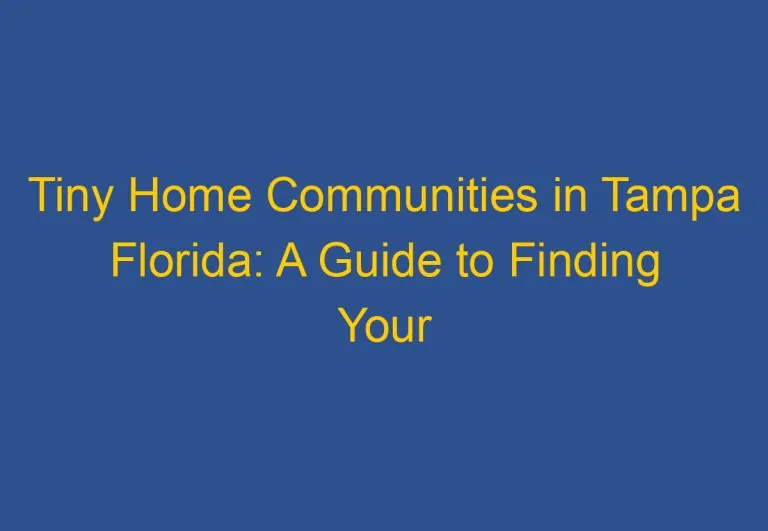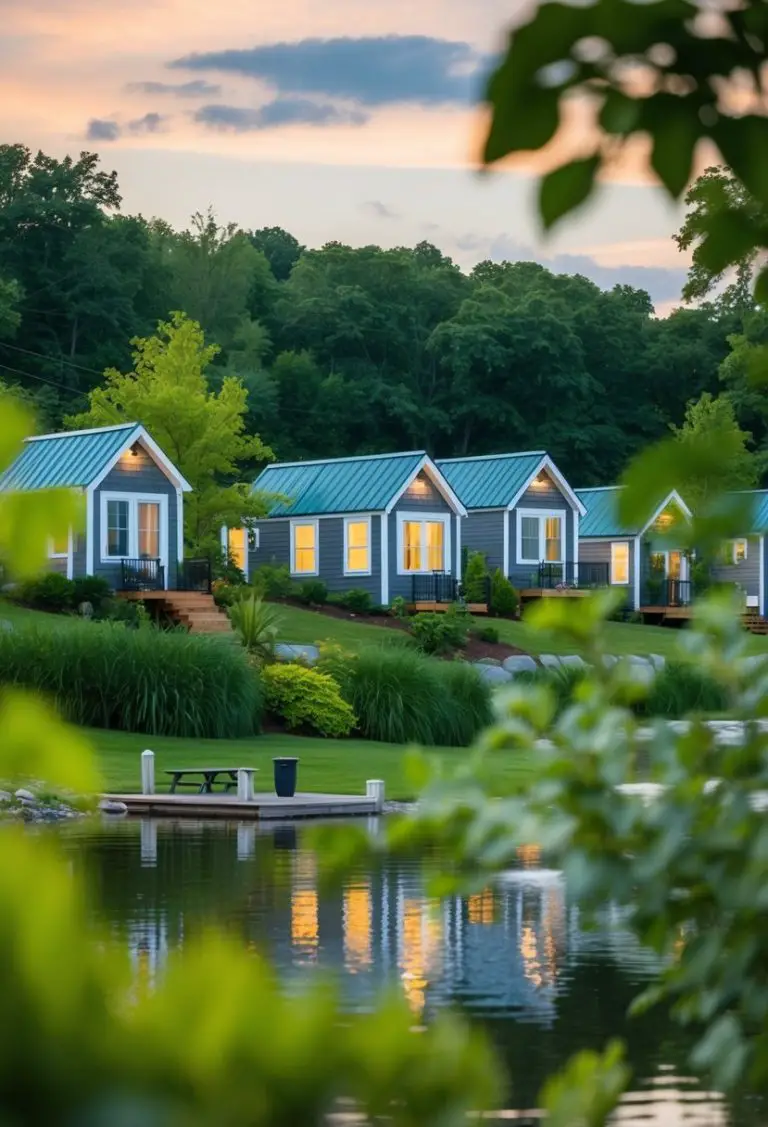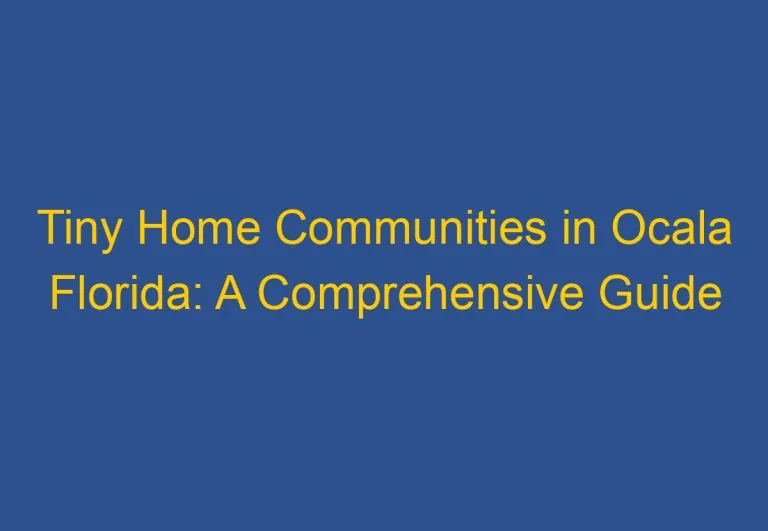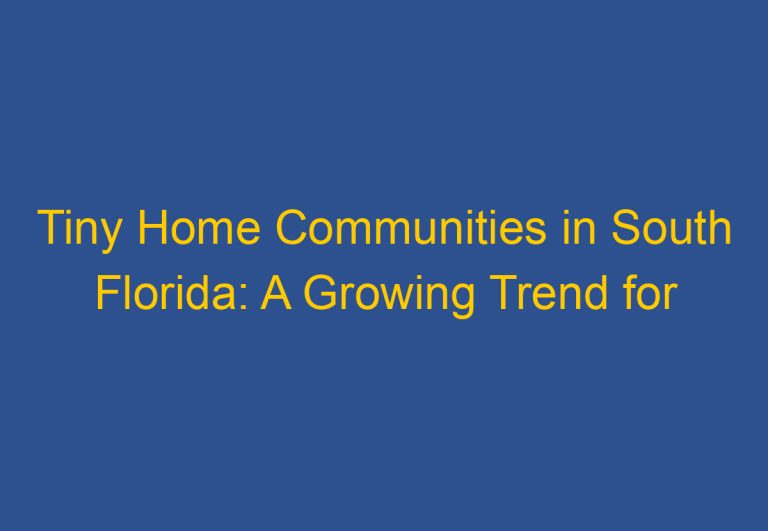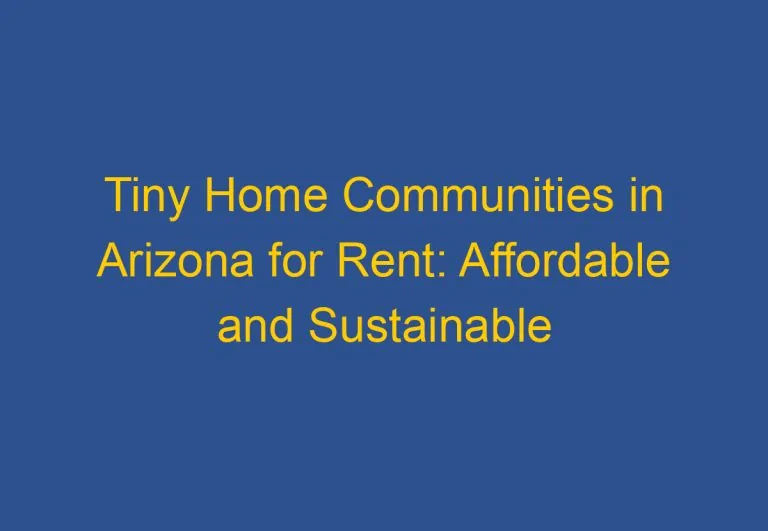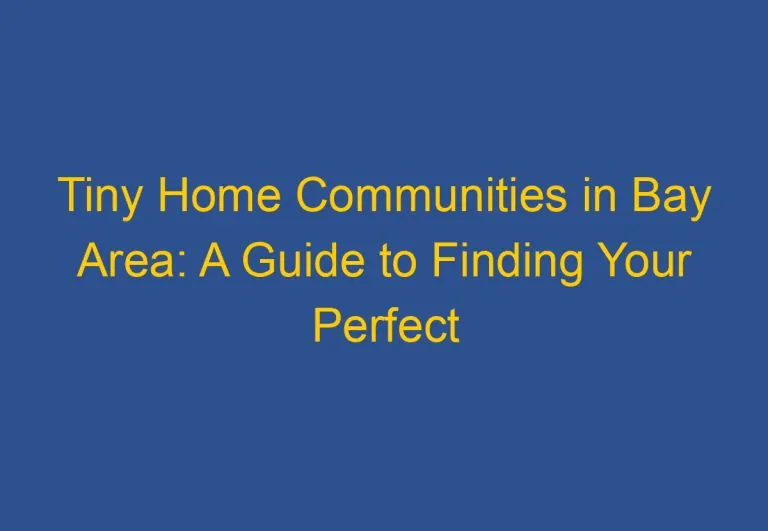Tiny Home Communities in Massachusetts: A Guide to Finding Your Perfect Community
Tiny homes are becoming an increasingly popular housing option in Massachusetts, with many communities popping up across the state. These communities offer a unique living experience that is both sustainable and affordable, while also fostering a strong sense of community among residents. Whether you’re looking for a permanent residence or a weekend getaway, there are many options available to suit your needs.
One of the main advantages of tiny home communities in Massachusetts is their focus on sustainability. Many of these communities are designed with eco-friendly features such as solar panels, rainwater harvesting systems, and composting toilets. This not only benefits the environment but also helps residents save money on utilities and reduce their carbon footprint.
In addition to their sustainability, tiny home communities in Massachusetts are also known for their affordability. With the cost of living in the state continuing to rise, many people are turning to tiny homes as a way to downsize and save money on housing expenses. These communities offer a range of housing options to suit different budgets, from basic cabins to luxury tiny homes with high-end amenities. And with shared resources such as community gardens, kitchens, and laundry facilities, residents can enjoy a comfortable lifestyle without breaking the bank.
Understanding Tiny Home Communities
Definition and Appeal of Tiny Homes
Tiny homes are small, compact living spaces that offer a simplified life with a smaller ecological footprint. They have become increasingly popular in recent years due to their affordability, mobility, and unique design. These homes range from 100 to 400 square feet and can be built on wheels or a fixed foundation.
The appeal of tiny homes lies in their minimalistic design and the freedom they provide. They allow people to live with less stuff, reduce their carbon footprint, and save money on housing costs. They also provide the opportunity to live a more mobile lifestyle, allowing people to travel and explore the world while still having a place to call home.
The Growth of Tiny Home Communities in Massachusetts
Tiny home communities have been popping up all over Massachusetts in recent years. These communities offer a unique living experience for those who are interested in tiny homes. They provide a sense of community and allow people to live in close proximity to others who share similar values and interests.
One of the largest tiny home communities in Massachusetts is Tiny Estates, located in Haverhill. This community is made up of over 30 tiny homes and offers amenities like a clubhouse, community garden, and access to a nearby lake. Residents of Tiny Estates also have access to a shared kitchen, laundry, and other common areas.
Another popular tiny home community in Massachusetts is McDonald by Fritz Tiny Homes. This community offers a variety of tiny homes to choose from and is located in a beautiful natural setting. It provides a sense of community and allows people to live in close proximity to nature.
Overall, tiny home communities offer a unique and exciting living experience for those who are interested in compact living. They provide a sense of community and allow people to live a simpler, more sustainable lifestyle.
Legal and Zoning Considerations
When it comes to tiny homes in Massachusetts, there are several legal and zoning considerations to keep in mind. This section will explore the state regulations and local laws, as well as the zoning challenges and building codes that are relevant to tiny home communities in the state.
State Regulations and Local Laws
In Massachusetts, tiny homes on wheels are allowed provided they meet certain criteria. According to the Zoning ByLaw 139, a tiny house is defined as a detached structure containing a dwelling unit less than 500 square feet constructed on a moveable trailer meant to be attached to a foundation. However, it is important to note that local laws may vary and it is always best to check with your specific town or city for regulations.
Zoning Challenges and Building Codes
One of the biggest challenges facing tiny home communities in Massachusetts is zoning. Many towns and cities have zoning regulations that require a minimum square footage for dwellings, which can make it difficult for tiny homes to be legally placed in certain areas. Additionally, building codes can also pose a challenge, as many codes require a certain amount of space for things like stairs and hallways.
Despite these challenges, there are some tiny home communities in Massachusetts that have successfully navigated the legal and zoning considerations. For example, the community at Cape Cod has been able to establish a tiny home community that complies with local zoning regulations and building codes.
Overall, it is important to do your research and consult with local authorities before embarking on a tiny home community project in Massachusetts. By understanding the state regulations and local laws, as well as the zoning challenges and building codes, you can ensure that your project is legally compliant and successful.
Lifestyle and Community Features
Amenities and Services
Tiny home communities in Massachusetts offer a unique set of amenities and services that cater to the needs and preferences of their residents. These communities typically include common areas, such as community gardens, playgrounds, and parks, where residents can gather and socialize. Some communities also offer amenities such as fitness centers, swimming pools, and laundry facilities.
In addition to these shared amenities, tiny home communities often provide residents with essential services, such as waste management, water, and sewer services. Many communities also provide on-site maintenance and repair services, which can be particularly helpful for those who are new to tiny home living.
Community Dynamics and Sustainability
One of the most significant benefits of living in a tiny home community is the sense of community and belonging that it provides. Many communities encourage social interaction and collaboration among residents, which can help foster a strong sense of community and support.
Sustainability is also a key feature of many tiny home communities in Massachusetts. Many communities are designed to be off-grid, meaning that they rely on renewable energy sources such as solar power. These communities often feature modern and eco-friendly amenities, such as composting toilets and rainwater harvesting systems.
Landscaping is another important aspect of many tiny home communities. Many communities feature beautifully landscaped common areas, which can help create a sense of tranquility and relaxation. Residents may also have the opportunity to participate in community gardening projects, which can help foster a sense of pride and ownership in the community.
In conclusion, tiny home communities in Massachusetts offer a unique and sustainable living experience that is designed to promote community, collaboration, and a strong sense of belonging. Whether you are looking for a modern and luxurious tiny home or a more rustic and eco-friendly RV, there is a tiny home community in Massachusetts that is sure to meet your needs and preferences.
Spotlight on Massachusetts Communities
Tuxbury Tiny House Village
One of the most popular tiny home communities in Massachusetts is the Tuxbury Tiny House Village. Located just a short drive from Boston, this community offers guests a unique and cozy experience. The tiny homes at Tuxbury are designed to be both comfortable and functional, with plenty of space for guests and their pets. Speaking of pets, Tuxbury is a pet-friendly community, so you can bring your furry friend along for the adventure.
Tuxbury Tiny House Village is situated near Tuxbury Pond, which offers guests an opportunity to enjoy a range of outdoor activities, including swimming, fishing, and boating. The community also has a swimming pool for those who prefer to stay on land. In addition to outdoor activities, Tuxbury is located near several vineyards, wineries, and restaurants, making it the perfect destination for foodies and wine lovers.
Other Notable Tiny Home Locations
While Tuxbury Tiny House Village is one of the most popular tiny home communities in Massachusetts, there are several other notable locations worth mentioning. For those who prefer to stay closer to Boston, there are several tiny home communities located in the city and surrounding areas, including Cambridge, Worcester, Springfield, Lowell, and New Bedford.
If you’re looking for a more unique experience, consider visiting Provincetown, a tiny home community located on the tip of Cape Cod. This community is known for its vibrant arts scene, stunning beaches, and lively nightlife. For those who prefer a more laid-back atmosphere, Somerville and Lynn are both great options.
Overall, Massachusetts is home to a wide range of tiny home communities, each with its own unique charm and appeal. Whether you’re looking for a cozy getaway or a more urban experience, there’s a tiny home community in Massachusetts that’s perfect for you.
Frequently Asked Questions
What are the top-rated tiny home communities in Massachusetts?
Massachusetts is home to several tiny home communities that offer a unique and affordable living experience. Some of the top-rated tiny home communities in Massachusetts include Escape Village in Concord, Bayside Bungalows in Southwick, and Tiny House Village at Sticks and Stones Farm in Newtown. These communities offer a range of amenities such as communal spaces, gardens, and recreational facilities.
Are there any luxury tiny house developments in Massachusetts?
Yes, there are luxury tiny house developments in Massachusetts. One such development is the Tiny House Village at Norton’s Woods in Lincoln. This community features high-end finishes, modern appliances, and spacious living areas. Other luxury tiny home communities in Massachusetts include Tiny House Village at Sticks and Stones Farm and Escape Village.
How much does a tiny house typically cost in Massachusetts?
The cost of a tiny house in Massachusetts can vary depending on several factors such as size, location, and amenities. On average, a tiny house in Massachusetts can cost anywhere from $50,000 to $100,000. However, it is important to note that some luxury tiny homes can cost upwards of $200,000.
Can I find tiny homes for sale or rent within Massachusetts communities?
Yes, there are several tiny homes for sale or rent within Massachusetts communities. Many tiny home communities offer both rental and purchase options for those interested in tiny home living. Some popular websites for finding tiny homes for sale or rent in Massachusetts include Tiny House Listings and Tiny House Marketplace.
What are the options for affordable tiny home living in Massachusetts?
Massachusetts offers several options for affordable tiny home living. Many communities offer rental options for those interested in trying out tiny home living without the commitment of a purchase. Additionally, some communities offer income-restricted units for those who qualify. It is important to research different communities and their specific options to find the best fit for your budget and lifestyle.
Is permanent residency allowed in Massachusetts tiny home communities?
Yes, permanent residency is allowed in Massachusetts tiny home communities. However, it is important to note that each community may have its own regulations and requirements for permanent residency. It is important to research and understand these regulations before committing to a tiny home community for permanent residency.







